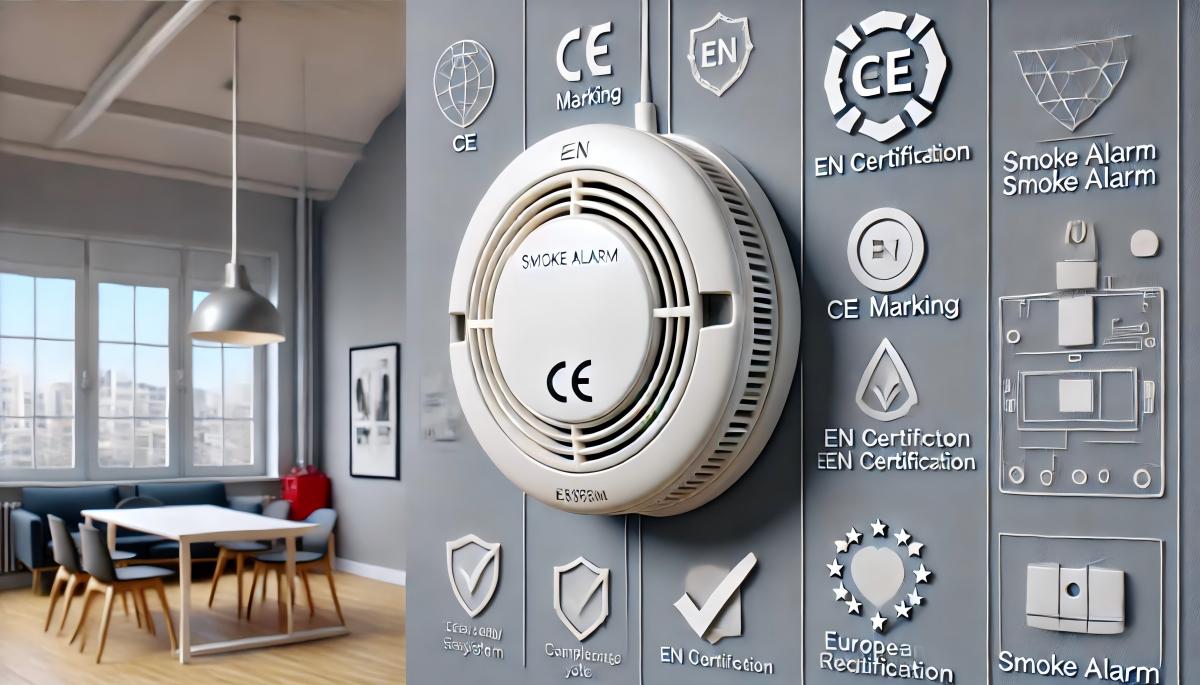To sell smoke detectors in the European market, products must comply with a series of stringent safety and performance certification standards to ensure reliable protection in emergencies. One of the most essential certifications is EN 14604.
also you can check here,the CFPA-EU:Provides explanations on the requirements for smoke alarms in Europe.
1. EN 14604 Certification
EN 14604 is a mandatory certification standard in Europe specifically for residential smoke detectors. This standard specifies design, manufacturing, and testing requirements to ensure the device can promptly detect smoke and issue an alarm during a fire.
The EN 14604 certification includes several critical requirements:
- Response Time: The smoke detector must respond quickly when smoke concentration reaches a dangerous level.
- Alarm Volume: The device's alarm sound must reach 85 decibels, ensuring that residents can clearly hear it.
- False Alarm Rate: The detector should have a low rate of false alarms to avoid unnecessary disturbances.
- Durability: EN 14604 also specifies durability requirements, including resistance to vibrations, electromagnetic interference, and other external factors.
EN 14604 is a fundamental requirement for entering the European market. In countries like the UK, France, and Germany, residential and commercial buildings are required to install smoke detectors meeting EN 14604 standards to protect residents’ safety.
2. CE Certification
In addition to EN 14604, smoke detectors also need CE certification. The CE mark signifies that a product complies with health, safety, and environmental protection laws within the European Union. Smoke detectors with CE certification indicate compliance with essential requirements across the European Economic Area (EEA). CE certification primarily focuses on electromagnetic compatibility and low voltage directives to ensure that the device operates effectively in various electrical environments.
3. RoHS Certification
Europe also has strict regulations regarding hazardous substances in products. RoHS certification (Restriction of Hazardous Substances) prohibits using specific harmful materials in electronic equipment. RoHS certification limits the presence of lead, mercury, cadmium, and other substances in smoke detectors, ensuring environmental safety and user health.
Battery Requirements for Smoke Detectors in Europe
In addition to certification, there are specific regulations regarding smoke detector batteries in Europe, particularly focusing on sustainability and low maintenance. Based on regulations for residential and commercial buildings, different battery types affect the device’s suitability and lifespan.
1. Long-Life Lithium Batteries
In recent years, the European market has increasingly shifted toward long-life batteries, especially built-in non-replaceable lithium batteries. Typically, lithium batteries have a lifespan of up to 10 years, matching the recommended replacement cycle for smoke detectors. Long-life lithium batteries offer several benefits:
- Low Maintenance:Users do not need to frequently replace batteries, reducing maintenance costs.
- Environmental Benefits: Fewer battery replacements contribute to less electronic waste.
- Safety:Long-lasting lithium batteries reduce risks associated with battery failures or low charge.
Some European countries even require new building installations to have smoke detectors equipped with non-replaceable, 10-year long-life batteries to ensure stable power throughout the device's life cycle.
2. Replaceable Batteries with Alarm Notifications
For devices using replaceable batteries, European standards require that the device provides a clear audible warning when battery power is low, prompting users to replace the battery promptly. Typically, these detectors use standard 9V alkaline or AA batteries, which can last around one to two years, making them suitable for customers who prefer lower initial battery costs.
3. Battery Power-Saving Modes
To meet the European market's demand for energy efficiency, some smoke detectors operate in a low-power mode when there is no emergency, extending battery life. Additionally, some smart smoke detectors have nighttime power-saving settings that reduce energy consumption through passive monitoring, while still ensuring rapid response in the event of smoke detection.

Conclusion
Selling smoke detectors in the European market requires compliance with certifications like EN 14604, CE, and RoHS to guarantee product safety, reliability, and environmental friendliness. Smoke detectors with long-life lithium batteries are increasingly popular in Europe, aligning with trends toward low maintenance and environmental sustainability. For brands entering the European market, understanding and adhering to these certification and battery requirements is essential to provide compliant products and ensure safety performance.
Post time: Nov-01-2024




